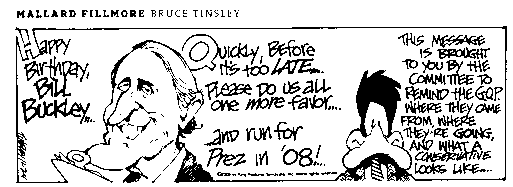Eli, Eli, lama sabachthani! Conservatives around the country are trying to figure out why they got spanked at the polls earlier this month. Answers vary: from it was the corruption, to we just weren't conservative enough:

Spot thinks the best answer comes, however, from a recent article in the American Conservative. Written by former director and trustee of the National Review (and recently asked to resign by the aforementioned Bill Buckley) Austin Bramwell. He said this about the notion that conservatism should return to its roots:
Another group pleads for the conservative movement to return to its alleged first principles. “If only people would still read Russell Kirk,” one hears. But the movement never had any first principles to begin with. Although it boasts a carefully husbanded canon of supposedly foundational texts, the men who wrote them—Kirk, Strauss, Voegelin, Weaver, Chambers, Meyer—were notorious eccentrics given to extravagant claims whose policy implications remain largely obscure. Russell Kirk, for example, even as he shrewdly positioned himself as the intellectual godfather of the conservative movement, had almost no political opinions whatsoever.
In other words, my odious little ducky friend, there's no there there. (Lasting fame to the grasshopper who can tell Spot who wrote that and about what, or maybe about where it was written.) The emperor not only has no clothes: he never had any!
But Spotty, maybe conservatism is more of a cultural thing, you know, based on local loyalties and associations.
About that, Bramwell says this:
Still others eulogize local attachments and ancestral loyalties. They invoke a litany of examples: family, church, kin, community, school, the “little platoons” in which Burke found the basis of political association. Celebrating such “infra-political” institutions may well have made sense in the 1950s, the high tide of American nationalism and federal government prestige. At most other times, however, ancestral attachments are dangerously subversive. The U.S. could not have survived had it not ruthlessly extirpated the ancestral loyalties of both natives and newcomers; Great Britain suffered endless civil wars before the great constitutional oak that Burke praised took root; the West itself succeeded precisely because it cut short the reach of the extended family or clan. Ancestral loyalties are the curse of uncivilized peoples, most especially in the hypermnesiac Middle East. Most ominously, praise of local attachments now comes in the guise of multiculturalism, perhaps the most insidious threat to a just order today. Not for nothing did communitarianism become a left-wing vogue. [we'll discuss this last sentence another time]
Bramwell delivers this valediction of the conservative movement of which he was a part:
But “conservatism” has no mystical essence. Rather than a magisterium handed down from apostolic times, it is an ideology whose contours are largely arbitrary and accidental. By ideology, I mean precisely what Orwell depicted in 1984. I do not mean, of course, that conservatism is totalitarian. Taken as prophecy, 1984 has little merit. Taken as a description of the world we actually live in, however, it is indispensable. 1984 reveals not the horrors of the future but the quotidian realities of ideology in mass democracy. Conservatism exemplifies them all.
Wow, Spotty! No wonder Bill Buckley asked him to resign.
Indeed, grasshopper. You are encouraged, boys and girls, to read the entire article. The watershed event for Bramwell's rejection of the conservative movement is the war in Iraq, but it's clear this has been building up in him for some time. Just let it out, Mr. Bramwell.
No comments:
Post a Comment